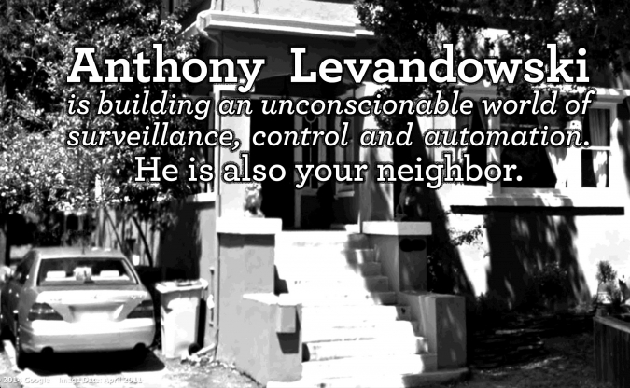
Google street view detail from the Counterforce flier. (Image cropped and house number redacted by Mother Jones.)via Indymedia
So, the Bay Area’s tech backlash has come to this: At 7 a.m. yesterday, activists showed up on the doorstep of Google engineer Anthony Levandowski to protest, well, pretty much everything. They’re holding the guy behind the self-driving car responsible for gentrification, destructive gold mining, Chinese sweatshops, government surveillance, and, more generally “the unspeakable horror” of helping “this disastrous economic system continue a bit longer.”
A flyer distributed by the activists, who call themselves “The Counterforce,” left little doubt that their fight is personal. “Preparing for this action, we watched Levandowski step out his front door,” it reads. “He had Google Glasses over his eyes, carried his baby in his arm, and held a tablet with his free hand. As he descended the stairs with the baby, his eyes were on the tablet through the prism of his Google Glasses, not on the life against his chest. He appeared in this moment like the robot that he admits that he is.”
After ringing Levandowski’s doorbell and holding a banner that said, “Google’s Future Stops Here,” the Counterforce distributed their flyer to his neighbors and blocked his driveway for 45 minutes. Then they walked to the nearby Ashby BART station and blocked a Google bus for another half-hour before being dispersed by police.
For all that anybody knows, the Counterforce could just be a few college kids who’ve overdosed on Derrida and Adbusters. Ars Technica, which had the story first, was unable to reach them. What’s clear is that their harassment tactics put them in the same league as anti-abortion activists. Sophisticated public relations this is not.
That said, many of the issues raised by Counterforce resonate in the Bay Area. Their protest took place on the same day that Google’s buses received a stamp of approval from the San Francisco Municipal Transportation Agency over the loud objections of anti-gentrification activists. Protests against the tech shuttles, including one in Oakland that turned violent, have become the most visible signs of public anger at the way that the regional tech boom has displaced low- and middle-income workers. Since 2011, rents in many San Francisco neighborhoods have increased by around 40 percent.
Add to these concerns a creeping unease about what tech companies and the government may be doing with our personal data, and you have the makings of a volatile backlash. The Bay Area has seen it before, be it with the Black Panthers, the Weather Underground, or the Symbionese Liberation Army. But hopefully it won’t come to that.

















